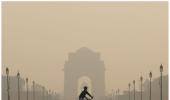Nearly 13 per cent of the museums around the world may never reopen, the United Nations's cultural agency has warned, as about 90 per cent of them globally have had to close their doors due to the
COVID-19 pandemic.

On the occasion of International Museum Day Monday, two studies by the UN Educational, Scientific and Cultural Organisation and the International Council of Museums said that museums have been especially affected by the COVID-19 pandemic, with nearly 90 per cent of them, or more than 85,000 institutions, having closed their doors for varying lengths of time during the crisis.
Furthermore, in Africa and the Small Island Developing States, only 5 per cent of museums were able to offer online content to their audiences.
"Nearly 13 per cent of museums around the world may never reopen," the agencies said in a statement.
The two studies, involving member states and museum professionals, were aimed at assessing the impact of COVID-19 on museums and museum institutions.
They also aimed to find out how the sector had adapted to the pandemic and explore ways to support institutions in its aftermath.
"Museums play a fundamental role in the resilience of societies," UNESCO Director-General Audrey Azoulay said. "We must help them cope with this crisis and keep them in touch with their audiences."
The study conducted by ICOM highlights the fact that museums that have been deprived of their visitors will face a decrease in their income.
Professions related to museums, their operations and their outreach could also be seriously affected.
"We are fully aware of and confident in the tenacity of museum professionals to meet the challenges posed by the COVID-19 pandemic," said ICOM President Suay Aksoy.
"However, the museum field cannot survive on its own without the support of the public and private sectors. It is imperative to raise emergency relief funds and to put in place policies to protect
professionals and self-employed workers on precarious contracts."
In a tweet, Secretary-General Antonio Guterres said that museums may be temporarily closed, but they remain a source of knowledge and discovery for many -- now through virtual tours in particular.
The analyses also explored how the sector was adapting to the pandemic and ways in which it could offer support once the pandemic ends.
With a view to affirm the resilience of art, UNESCO launched the ResiliArt movement last month, which, among other things, conducts virtual high-level exchanges between international professionals
and draws support for the cultural world during the crisis.
According to UNESCO, social protection of museum staff, digitisation and inventorying of collections and online content development, are among the top priorities that need to be addressed all of which
require financial resources.
UNESCO also pointed out that since 2012, the number of museums globally has increased by almost 60 per cent to about 95,000 institutions, demonstrating how important they have become in national
cultural policies over the past decade.
The study also revealed wide regional disparities, with Africa and Small Island Developing States, accounting for only 1.5 per cent of the total number of museums worldwide.
Furthermore, only five per cent of museums in Africa and SIDS were able to offer online content to their audiences.
"This pandemic also reminds us that half of humanity does not have access to digital technologies," the UNESCO chief said.
"We must work to promote access to culture for everyone, especially the most vulnerable and isolated."
These findings echoed a previous report on the implementation of the 2015 UNESCO Recommendation Concerning the Protection and Promotion of Museums and Collections, their Diversity and their Role
in Society.
In it, the agency underlined the fundamental role that museums play in education, culture and in supporting the local and regional creative economy.











 © 2025
© 2025